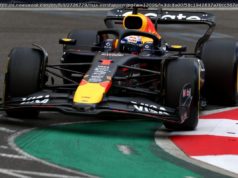Lionel Messi and Cristiano Ronaldo are clearly two of the greatest footballers of all time and following the elimination of Argentina and Portugal they’re unlikely to ever become World Cup winners.
Lionel Messi and Cristiano Ronaldo are clearly two of the greatest footballers of all time, and following Saturday’s elimination of Argentina and Portugal they’re unlikely to ever become World Cup winners.
With both now in their early 30s, it seems they’ll join a list of great players who could not cap their international careers with the biggest prize of all.
Here are five who failed to lift the World Cup:
FERENC PUSKAS
In the early 1950s, Hungary was the best team in the world and entered the 1954 World Cup in Switzerland as the overwhelming favorite. After all, Hungary was unbeaten in four years and was led by Puskas, the game’s most complete player.
Puskas had it all — creativity, tight control and a thunderous shot.
Nicknamed the « Galloping Major » because of his army rank, Puskas scored one of the two goals that gave Hungary an early 2-0 lead in the World Cup final. West Germany, though, rallied and defeated the « Magical Magyars » 3-2.
Puskas would — like Ronaldo in years to come — become a serial winner of the European Cup at club level with Real Madrid. But there would be no more World Cup chances for Puskas after he moved to Spain in the wake of the 1956 crushing of the Hungarian Revolution.
EUSEBIO
England may have won the 1966 World Cup at home but the star player was undoubtedly Portugal striker Eusebio da Silva Ferreira.
Hailing originally from Mozambique, Eusebio was arguably the first great African player.
He had a powerful shot and scored an astonishing nine goals in six matches at the World Cup in ’66, including four against North Korea that got Portugal, playing in the tournament for the first time, out of a deep hole.
And though he scored a penalty in a classic semifinal match against England, Eusebio would leave Wembley Stadium in tears after Portugal lost 2-1.
Portugal would not make another World Cup in Eusebio’s time, but he had left his mark on the history of the tournament.
GEORGE BEST
At least Eusebio got to play in a World Cup. George Best never had the chance because Northern Ireland never qualified for the tournament during his time.
Best was as skillful a footballer as the game has seen. A genius.
The world would have to make do with watching Best perform his wizardry for Manchester United, notably in 1968 when Best was instrumental in United beating Eusebio’s Benfica 4-1 in the European Cup final. After normal time ended 1-1, Best scored United’s second goal after rounding goalkeeper Jose Henrique and calmly slotting the ball into the empty Benfica net.
Unfortunately, Best’s time at the top was not as long as his talent merited.
JOHAN CRUYFF
Along with Puskas’ Hungary team of 1954, the Dutch side of 1974 is widely perceived to be one of the best not to win the World Cup. Packed with players from the great Feyenoord and Ajax sides that dominated the European Cup in the early 1970s, the team pioneered « Total Football, » a strategy that effectively did away with positions — players were interchangeable on the field at all times.
Johan Cruyff was at its heart. Lithe and perfectly balanced, he could do things with the ball that others could barely dream of. The « Cruyff Turn, » for example, was first glimpsed in the 1974 World Cup. With his back to Sweden defender Jan Olsson, Cruyff dragged the ball with his right foot behind his planted left foot, abruptly turned and darted toward the ball. Olsson was bamboozled, as was the international TV audience.
Cruyff scored three goals during the tournament, including a superb volley against Brazil that confirmed the Netherlands would make the final, where the team in orange was widely expected to prevail against host West Germany. Instead, the Dutch failed to push on from their early lead and the Germans came from behind to win 2-1.
Cruyff didn’t go to the World Cup four years later in Argentina following a last-minute withdrawal. He later revealed his absence was because of a kidnapping attempt months earlier.
ZICO
Brazil has won the World Cup a record five times. But in the middle of those victories there was a 24-year drought.
Undoubtedly, the best Brazil player during that period between 1970 and 1994 was Zico.
In 1982, Zico was part of a thrilling Brazil side and a first World Cup triumph in 12 years looked likely. The goals were abundant and often sensational.
Zico was the heartbeat of that midfield, his passing central to the team’s rhythm. But in the end, Brazil’s deficiencies in defense cost it dearly and Italy, inspired by Paolo Rossi, knocked the team out in a classic encounter.
No Brazil team since has played with such attacking intent. And arguably, Brazil has not had a midfielder like Zico since despite winning the World Cup in 1994 and in 2002.






